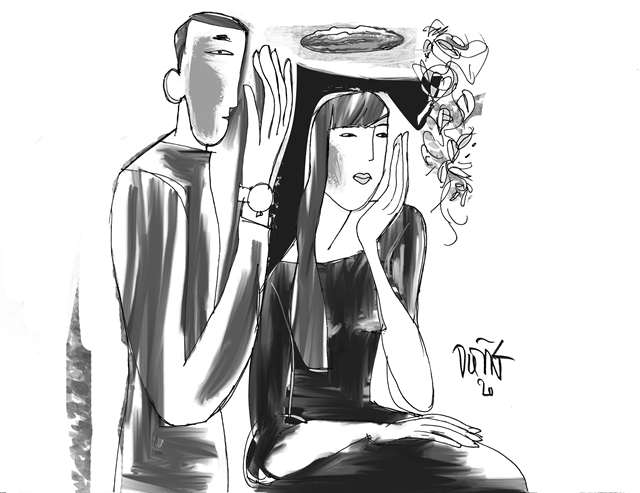

A short story by Nguyễn Ngọc Thuần

|
| Illustration by Đỗ Dũng |
By Nguyễn Ngọc Thuần
Just one short hour earlier, I had yet to profess my love for X. She and I had been chatting about this and that in my office during the lunch break: the weather, the past, even my crazy ex-girlfriend. X, in turn, told me about a funeral she’d been to, where she sat near a dying old woman. She imagined, at that moment, the old woman soon dropping dead. She could envision her thin, transparent, amber-like nails.
And every time she went to a funeral, by some coincidence or perhaps just her imagination running wild, she always seemed to be seated near one dying old woman or another. As she told me this she smiled, enigmatically.
It’s just a coincidence, I assured her. Yes, she replied, it is indeed. But she couldn’t help thinking that she’s somehow had a tendency to seek out dying old women at every funeral she’s been to.
Another reason, I wondered out loud, maybe that funerals inherently trigger thoughts and reactions. Like a friend of mine who always has to pee whenever he flies. As the plane prepares for take-off and the bathroom is off limits, this friend of mine sits deathly still and focuses solely on keeping it all in. His bladder is on the verge of bursting. But if it did burst, he always thinks, he would die right then and there, and gee, what a shame that would be. And an embarrassment. People would burst out laughing at such a ridiculous demise. In life, he provided the odd laugh, but in death he causes uproarious laughter. What would happen at his funeral? What would be said about the bursting bladder affair?
So, before he boards a plane, this friend of mine, I went on, methodically drains himself of every drop, shutting himself in a restroom for an age. He does everything he can to ward off such a laughable death. But no sooner is he on the plane than he again feels bloated and uncomfortable. Why oh why can’t we use the bathrooms during take-off?
A friend of his once told him that his issue lies in the take-off being the most dangerous part of a flight. A plane needs to reach a certain height before it’s “safe”. But he didn’t buy it, my friend. He didn’t see any safety at any moment during any flight. Any feeling of security was bogus. The sky and the air were bogus. The entire flight was unsafe, at every point.
I was only telling X half the story, though, for that friend of mine, with the questionable bladder, was me. There is a certain truth, I’ve found: it’s easier to reveal oneself in the third-person, as if one were somebody else.
A friend of mine, X said in reply, who I flew with once, has a similar urge. She even tried to get off the plane one time.
Is she really talking about a friend, I immediately wondered, or was the “friend” X herself? Is she also using the third-person? I then began to consider how similar our minds may be. If we are so alike, does she realise that the “bladder guy” is me? Are we both talking about ourselves in the third-person?
And what is happening when we only talk about ourselves in the third-person? It’s like we’re contemplating our dead bodies in a coffin. We are living vicariously through some dead people tales. They’re dead already, and we can talk about them objectively.
Again, our conversation had turned to the subject of death.
Do you believe in precognition, X asked. A few days ago, she began, I went to the first death anniversary of a colleague. What was special was that the menu had been prepared by my colleague herself. Or maybe, I wondered, someone in her family prepared it, and her foreseeing her death was just a story. A fable. I’d like to think, she continued, that sometimes people can foresee their final days and leave something behind for others to remember them by.
Not long ago, I told X, I read a news story about an old woman who, upon being told she had terminal cancer, prepared enough food for her elderly husband to eat for the rest of his days.
Just imagine, I went on, the old man opening the fridge every day, taking out a small package of food, defrosting it, and as he sat down eating all by himself, remembering the woman who had been with him through life and now nourished him in death.
Oh well, I said suddenly, looking around, an urge overtaking me, I think I’ll go down to the cafeteria and grab something to eat. Are you coming? The menu today is free of soul, and so fit for those who are alive, I explained, not feeling particularly thrilled by the soulless dishes that await.
But our conversation hadn’t ended. X was talking about premature death. Young people dying. These days, she said, young people seem more vulnerable than older people. They could die from what would pass as a minor toothache in old times. Young people just aren’t resilient, she said.
So we had returned to death yet again. We kept talking and, before we knew it, an hour had passed, and I was soon to make a proposition to X.
We headed to the cafeteria, where we both chose dishes that had as little meat, or “soul”, as possible.
I’m not at all sure why, I told X, but I believe that water spinach has less soul than chicken. Vine spinach soup has less soul than crab soup. And freshwater crab has less soul than a cow, which in turn has less soul than a turtle. A turtle has less soul than a dog. And a dog has less soul than an ape.
Does Asiatic pennywort, X asked with humour in her eye and voice, have more soul than jute? We tend to believe something has soul if it’s near and dear to humans, she said. Animals that live with us are given more soul than those who live away from us.
I think, she continued, that my late father’s tobacco pipe has more soul than a dog. I even think his soul resides there. A dog doesn’t mean that much to me.
Oh, I answered, then my ex’s coat, which she left behind, has even more soul than the crazy woman herself. Since we broke up, I’ve looked at it and thought a lot about our relationship. It brings back memories. But I don’t really think about her. Just her coat.
Perhaps we should fall in love, I said out of the blue. My proposition. Here it was. What do you mean, she smiled? Why did you say we should fall in love, while I was talking about the soul of a dog?
Were you talking about the soul of a dog, I asked, my mind swimming from the words that just came out of my mouth.
I was, she said. We went from dog to love in about three seconds.
Oh, really, I replied. Maybe it’s just a fault in our reasoning. Maybe our minds think so fast that, as we talk, we can squeeze in a whole other story about the past. For we know the past by heart, and need only a second, not three. So, while you were talking about the soul of a dog, I was thinking about my crazy ex and our three years and four months of shrill bickering.
We can fall in love, I continued, even though just three seconds ago we were talking about a dog.
X smiled.
Okay? I pressed.
Let me think about it, X replied. Let me think what I could gain and what I could lose if I loved you.
After three seconds, she answered, No, I won’t love you.
What were you thinking about for those three seconds, I asked.
I thought about my failed marriage, X answered. I thought about those five years living with my ex-husband. Five years of feeling suffocated.
See, I said, you can remember five years in just three seconds.
Was it three seconds, she asked? Were you timing my thinking?
I was, I said. I wanted to know how many seconds of your life and old love can be condensed into.
How odd, X replied.
Yes, quite strange, I agreed.
So, in that three seconds, she asked, what were you thinking about?
I was thinking how what I said was a mistake, I told her. When I asked if we should fall in love, I think I was actually recalling my old relationship, and thinking you were more deserving than my ex, so I wondered why I hadn’t fallen in love with you instead. You’re many times better than her. So I just blurted out, let’s fall in love. But no sooner had I asked than I felt a little afraid. I fear that if you accepted my proposition, what would happen? It’s not like I could reject your acceptance. What on earth am I saying?
Lucky, X said, laughing, that it’s impossible to fall in love and recognise it after just three seconds.
Right, I ventured, we shouldn’t love each other. If you can fall in love in three seconds, you can also fall out of love in three seconds.
Do our minds dictate our behaviour, I wondered out loud. Love is different.
Yes, love is different, we agreed.
So, we won’t fall in love, X concluded.
No, we won’t, I confirmed.
Then we left the cafeteria.
As we headed for the door, the woman behind the counter asked why we were leaving so early. There’s cucumber soup on the menu today. Perhaps cucumbers have soul, X whispered, so we shouldn’t eat them.
Translated by Đỗ Linh









